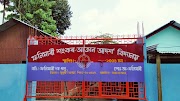History Of The College
B. N. College being the premier seat of learning in the Western part of Assam, had so far earned many a laurels for the state. At a meeting held on 26th August, 1944 in Dhubri Govt. High School premises that was presented by Late (Mr) Zahirul Huq Esqr, the then Deputy Commissioner of erstwhile Goalpara district, the feasibility of a college in both Arts and Science stream at Dhubri was discussed. A resolution was taken in the meeting to establish ‘Dhubri College’ which was attented by Rai Bahadur B. M. Dutta, Rai Bahadur A. U. Ghosh, Khan Bahadur Abdul Mozid Ziaos Shames, Mr. R. K. Bose, Zahaduddin Ahmed, Mucunda Narayan Barua, Mr. S. K. Bose and many others. The college was later in 1946 named as ‘Bhola Nath College’ after the name of Bhola Nath Choudhuri, father of Mr. Jyotsna Nath Choudhri, Zamindar of Mechpara who donated Rs. 1 lakh and in addition offered the facilities of using the lands and buildings at Dhubri belonging to his mother till such time as it would be possible for the college to shift to its permanent sites and habitation.

The college started functioning from the present DEEO office of ward No. 2, Dhubri town and was formally inaugurated on the 16th of August 1946 under the principal ship of Dr. Phani Bhushan Ray, M A, Ph.D. Initially the college was affiliated to the Calcutta University. Later on it became one of the affiliated colleges of Gauhati University when it came into being in 1948. In 1960-61 the college was shifted to the present campus at ward No. 15. of Dhubri town.
Vision
The vision of Bholanath College is to provide quality higher education with an attempt to inspire, prepare, and empower students of its catchment area to succeed in a changing world.
Mission
Bholanath College strives to achieve its vision by
- Committing itself to intellectual exercises based on effective teaching, interaction programme and exchanges in order to lift the diverse communities from stagnation to development,
- Nurturing emerging disciplines and the creation of new knowledge and artistic expression in response to a rapidly changing world,
- Inculcating deep historical knowledge of diverse cultures at home and abroad
- Making effective use of the emerging technological tools to create skilled manpower and to bridge the gap between social needs and higher education.
- Creating a congenial atmosphere to create and disseminate knowledge of human experience, thought and creativity to advance human welfare in all its dimensions,
- Actively cultivating efforts aimed at developing students into independent-minded, responsible global citizens.




0 Comments